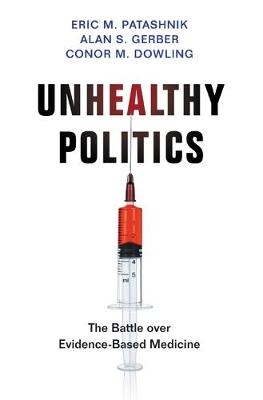
Unhealthy Politics
Princeton University Press (Verlag)
978-0-691-15881-5 (ISBN)
How partisanship, polarization, and medical authority stand in the way of evidence-based medicine The U.S. medical system is touted as the most advanced in the world, yet many common treatments are not based on sound science. Treatments can go into widespread use before they are rigorously evaluated, and every year patients are harmed because they receive too many procedures--and too few treatments that really work. Unhealthy Politics sheds new light on why the government's response to this troubling situation has been so inadequate, and why efforts to improve the evidence base of U.S. medicine continue to cause so much political controversy and public trepidation. This critically important book draws on public opinion surveys, physician surveys, case studies, and political science models to explain how political incentives, polarization, and the misuse of professional authority have undermined efforts to tackle the medical evidence problem and curb wasteful spending.
It paints a portrait of a medical industry with vast influence over which procedures and treatments get adopted, and a public burdened by the rising costs of health care yet fearful of going against "doctor's orders." The book shows how the government's efforts to promote evidence-based medicine have become mired in partisan debates. It also proposes sensible solutions that can lead to better, more efficient health care for all of us. Unhealthy Politics offers vital insights not only into health policy but also into the limits of science, expertise, and professionalism as political foundations for pragmatic problem solving in American democracy.
Eric M. Patashnik is the Julis-Rabinowitz Professor of Public Policy and Political Science at Brown University. His books include Reforms at Risk (Princeton). Alan S. Gerber is the Charles C. and Dorathea S. Dilley Professor of Political Science at Yale University. His books include Field Experiments. Conor M. Dowling is associate professor of political science at the University of Mississippi. He is the coauthor of Super PAC!
List of Figures and Tables vii
Acknowledgments xi
Introduction 1
1 The Medical Guesswork Problem 21
2 Sham Surgery: A Case Study of the Use of Medical Evidence 37
3 Doctor Knows Best: The Influence of Physician Leadership on Public Opinion 60
4 The Limits of Professional Self-Regulation: Findings from a National Physician Survey 79
5 Zero-Credit Politics: The Government's Sluggish Effort to Promote Evidence-Based Medicine, 1970s-2008 110
6 Electoral Competition, Polarization, and the Breakdown of Elite-Led Social Learning 142
Conclusion: Postenactment Coalition Building (and Other Strategies for Sustaining Reform in a Polarized Age) 161
Appendixes 181
Notes 197
Bibliography 225
Index 255
| Erscheinungsdatum | 29.01.2018 |
|---|---|
| Zusatzinfo | 17 line illus. 9 tables. |
| Verlagsort | New Jersey |
| Sprache | englisch |
| Maße | 152 x 235 mm |
| Gewicht | 454 g |
| Themenwelt | Studium ► Querschnittsbereiche ► Geschichte / Ethik der Medizin |
| Studium ► Querschnittsbereiche ► Prävention / Gesundheitsförderung | |
| Recht / Steuern ► EU / Internationales Recht | |
| Recht / Steuern ► Privatrecht / Bürgerliches Recht ► Medizinrecht | |
| Sozialwissenschaften ► Politik / Verwaltung ► Politische Theorie | |
| Sozialwissenschaften ► Politik / Verwaltung ► Staat / Verwaltung | |
| ISBN-10 | 0-691-15881-9 / 0691158819 |
| ISBN-13 | 978-0-691-15881-5 / 9780691158815 |
| Zustand | Neuware |
| Haben Sie eine Frage zum Produkt? |
aus dem Bereich


